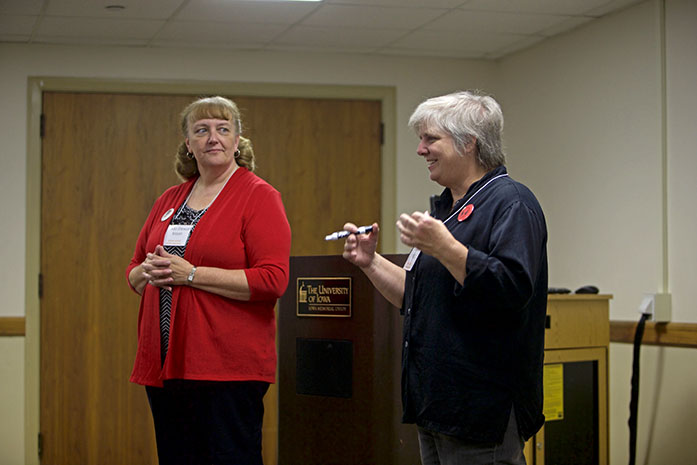By Anis Shakirah Mohd Muslimin
A symposium exploring “Social Justice after Ferguson” wrapped up Oct. 16 in the IMU.
University of Iowa Department of Gender, Women, and Sexuality Studies owrganized the conference to gather people and have dialogues about many issues pertaining to the racial disparity and the country’s criminal-justice system.
Amy Weismann, the assistant director at the UI Center for Human Rights, said the symposium is significant to understand the meaning of human rights, the challenges that come with it, and the failures and success of the current criminal-justice system in the United States.
“This is currently the country on the planet that incarcerates the most people, and that goes hand in hand with the way in which we’ve chosen to address a lot of the social problems in our country,” she said. “Arrest and jailing has been a way to handle people, and a more comprehensive solution is needed because it affects everyone, and people need to pay more attention to it.”
The two-day conference included workshops for students and faculty, lectures, and a panel discussion.
The highlight of the symposium was talk by guest speakers Mariame Kaba and Joey Mogul.
Kaba is the founder and director of Project NIA, an organization based in Chicago that has a vision to end youth incarceration. She spoke about the shooting of Trayvon Martin by George Zimmerman in 2012. Mogul is a partner at the People’s Law Office in Chicago.
“When [George] Zimmerman saw Trayvon Martin, he saw criminality already inscribed in his body and being, regardless if he was in the process of committing a crime, had the intentions to commit a crime, or was escaping from having committing a crime, he was assumed to be a criminal,” she said to the crowd.
Kaba started her talk by focusing on the particular killing of Martin as one of many instances of police brutality aimed at people of color, particularly African Americans.
“Martin was a walking threat, his very skin weaponized, and if he wasn’t a criminal at the time he was murdered, the idea was that he inevitably was on the march to criminality,” she said.
Kaba went on to highlight the deaths of other young African-Americans due to police brutality and about the We Charge Genocide Coalition — an activist group that aims to voice the experiences of the young people most targeted by police violence in Chicago.
“I begin with Trayvon Martin’s death because I think this incident would be look back on as the catalyst of a new consciousness and a willingness to rebel among young people of color, especially young black people, she said.
According to a 2013 report by the Coalition for Racial Justice, black youths in Johnson County were almost six times more likely to be arrested than white youths in the year 2011.
However, Weismann said the people involved in the conference do not conclude that all law enforcers are bad, because it all depends on the context — which she said is influenced by historical, cultural, social, and political reasons that make abusive relationships with law enforcement a reality.
“I work at prisons regularly, and if you go into any prison or juvenile facility in the state, you would see a lot more faces that are black and brown than you would see in the general population,” said Rachel Williams, the head of UI Gender, Women’s, and Sexuality Studies.
She said racial discrimination is still present in Iowa and people need to rethink how they frame people based on the myth of race.
“Race in itself is a myth, and we use it in this country to decide how to control people and who to control,” Williams said. “That is obviously something we need to recognize, we have an issue, and we are trying to control the issue by locking people up.”



